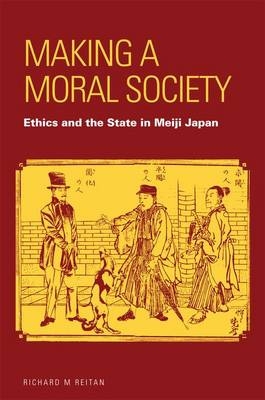
Making a Moral Society
Ethics and the State in Meiji Japan
Seiten
2009
University of Hawai'i Press (Verlag)
978-0-8248-3294-0 (ISBN)
University of Hawai'i Press (Verlag)
978-0-8248-3294-0 (ISBN)
Presents a study of ethics in Meiji Japan (1868-1912) that explores the struggle to define a common morality for the emerging nation-state. This book considers the fluidity of moral subjectivity by juxtaposing rinrigaku texts with moral writings by religious apologists.
This innovative study of ethics in Meiji Japan (1868-1912) explores the intense struggle to define a common morality for the emerging nation-state. In the Social Darwinist atmosphere of the time, the Japanese state sought to quell uprisings and overcome social disruptions so as to produce national unity and defend its sovereignty against Western encroachment. Morality became a crucial means to attain these aims. Moral prescriptions for re-ordering the population came from all segments of society, including Buddhist, Christian, and Confucian apologists; literary figures and artists; advocates of natural rights; anarchists; and women defending nontraditional gender roles. Each envisioned a unity grounded in its own moral perspective. It was in this tumultuous atmosphere that the academic discipline of ethics (rinrigaku) emerged - not as a value-neutral, objective form of inquiry as its practitioners claimed, but a state-sponsored program with its own agenda. After examining the broad moral space of 'civilization', Richard Reitan turns to the dominant moral theories of early Meiji and the underlying epistemology that shaped and authorized them. He considers the fluidity of moral subjectivity (the constantly shifting nature of norms to which we are subject and how we apprehend, resist, or practice them) by juxtaposing rinrigaku texts with moral writings by religious apologists. By the beginning of the 1890s, moral philosophers in Japan were moving away from the empiricism and utilitarianism of the prior decade and beginning to place 'spirit' at the center of ethical inquiry. This shift is explored through the works of two thinkers, Inoue Tetsujiro (1856-1944) and Nakashima Rikizo (1858-1918), the first chair of ethics at Tokyo Imperial University. Finally, Reitan takes a detailed look at the national morality movement (kokumin dotoku) and its close association with the state before concluding with an outline of some conceptual linkages between the Meiji and later periods.
This innovative study of ethics in Meiji Japan (1868-1912) explores the intense struggle to define a common morality for the emerging nation-state. In the Social Darwinist atmosphere of the time, the Japanese state sought to quell uprisings and overcome social disruptions so as to produce national unity and defend its sovereignty against Western encroachment. Morality became a crucial means to attain these aims. Moral prescriptions for re-ordering the population came from all segments of society, including Buddhist, Christian, and Confucian apologists; literary figures and artists; advocates of natural rights; anarchists; and women defending nontraditional gender roles. Each envisioned a unity grounded in its own moral perspective. It was in this tumultuous atmosphere that the academic discipline of ethics (rinrigaku) emerged - not as a value-neutral, objective form of inquiry as its practitioners claimed, but a state-sponsored program with its own agenda. After examining the broad moral space of 'civilization', Richard Reitan turns to the dominant moral theories of early Meiji and the underlying epistemology that shaped and authorized them. He considers the fluidity of moral subjectivity (the constantly shifting nature of norms to which we are subject and how we apprehend, resist, or practice them) by juxtaposing rinrigaku texts with moral writings by religious apologists. By the beginning of the 1890s, moral philosophers in Japan were moving away from the empiricism and utilitarianism of the prior decade and beginning to place 'spirit' at the center of ethical inquiry. This shift is explored through the works of two thinkers, Inoue Tetsujiro (1856-1944) and Nakashima Rikizo (1858-1918), the first chair of ethics at Tokyo Imperial University. Finally, Reitan takes a detailed look at the national morality movement (kokumin dotoku) and its close association with the state before concluding with an outline of some conceptual linkages between the Meiji and later periods.
Richard M Reitan is assistant professor of history at Franklin and Marshall College in Lancaster, Pennsylvania.
| Erscheint lt. Verlag | 30.11.2009 |
|---|---|
| Zusatzinfo | 4 illustrations |
| Verlagsort | Honolulu, HI |
| Sprache | englisch |
| Gewicht | 543 g |
| Themenwelt | Geschichte ► Allgemeine Geschichte ► Neuzeit (bis 1918) |
| Geisteswissenschaften ► Geschichte ► Regional- / Ländergeschichte | |
| Geschichte ► Teilgebiete der Geschichte ► Kulturgeschichte | |
| Geschichte ► Teilgebiete der Geschichte ► Sozialgeschichte | |
| Geisteswissenschaften ► Philosophie ► Ethik | |
| ISBN-10 | 0-8248-3294-9 / 0824832949 |
| ISBN-13 | 978-0-8248-3294-0 / 9780824832940 |
| Zustand | Neuware |
| Haben Sie eine Frage zum Produkt? |
Mehr entdecken
aus dem Bereich
aus dem Bereich
Europa 1848/49 und der Kampf für eine neue Welt
Buch | Hardcover (2023)
DVA (Verlag)
CHF 67,20
Giordano Bruno - ein ketzerisches Leben
Buch | Hardcover (2024)
C.H.Beck (Verlag)
CHF 41,85


